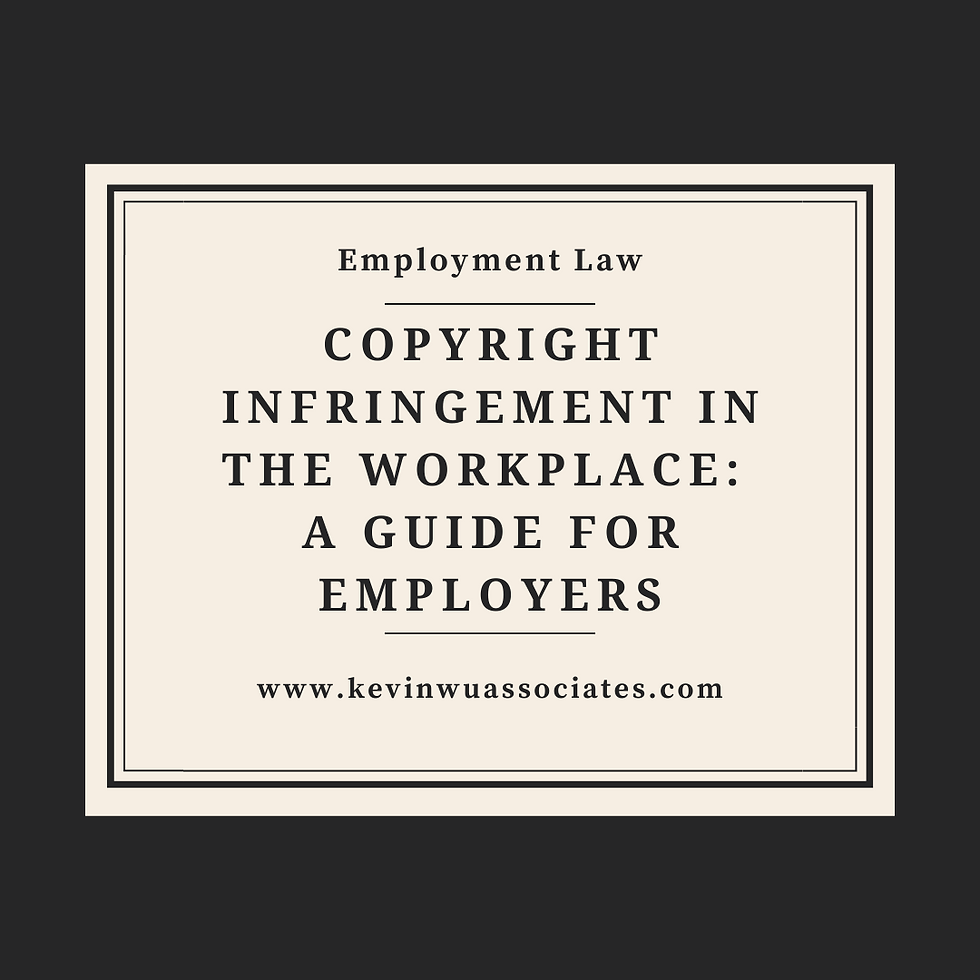Non-Performance of Contract during Covid-19
- Kevin Wu & Associates

- Feb 25, 2021
- 3 min read
Updated: Dec 2, 2022
The Covid-19 pandemic has posed unprecedented challenges to public health, livelihood and the working industry. The seemingly never-ending extensions of ‘lock-downs’ have up-ended life and further escalated the pressure in the economy. As a result, many businesses find that it becomes difficult, or impossible, to perform their contractual duties. In these situations, what can businesses do to avoid a breach of contract and pay high penalty fees?
Force majeure clause
Parties may rely on a force majeure clause which relieves them from contractual obligations due to the occurrence of unforeseeable events. It is not implied by law and must be expressly agreed on by parties to a contract.
What do you need to prove?
A party seeking to rely on a force majeure clause must show that:
the force majeure event was the cause of the inability or delayed performance;
their non-performance was due to circumstances beyond their control; and
there were no reasonable steps that they could have taken to avoid or mitigate the event or its consequences.
A notice must also be given to the other contracting party before invoking the force majeure clause.
Effect of a force majeure clause
The usual remedy is that the affected party will be excused from performing the contract in whole or in part without any damages payable. Extension of time, suspension of time, or termination in the event of continued delay or non-performance may also be provided.
Frustration of contract
In the absence of a force majeure clause, parties can rely on the doctrine of frustration so as to avoid liability for what would otherwise be a breach of contract. A contract becomes frustrated when an event occurs which has rendered it impossible or unlawful to perform the contractual obligations. In Malaysia, the doctrine of frustration is governed by section 57 (2) of the Contracts Act 1950.[1]
What amounts to frustration?
Parties must prove on 3 essential grounds that a contract is frustrated[2]:
the frustrating event is unforeseeable and not provided for in any provisions of the contract
not self-induced
renders it radically different from what was originally contracted for
Is Covid-19 a frustration event?
The timing in which parties entered into the contract is the essence. A contract is not frustrated if it was made when the pandemic is within the contemplation of the parties. It is debatable whether a pandemic would be considered to be unforeseeable given there are previous outbreaks such as H1N1 and SARS. However, it can be argued that the extent of the global government enforced lockdowns and the speed of transmission was unforeseeable.
Effect of frustration
The contract becomes automatically void and parties are therefore discharged from further obligations under the contract. Any person who has received any advantage under the contract must restore or make compensation to the person whom he received it from.[3]
Other relief for non-performance of contractual duties
The s.7 of The Temporary Measures for Reducing the Impact of Covid19 Act 2020[4] relieves certain contractual parties from its obligations during the entire Contract Relief Duration, if such failure of performance is caused by the measures and restrictions imposed under the Prevention and Control of Infectious Diseases Act 1988[5]. The “Contract Relief Duration” has been extended for the period from 1 January 2021 to 31 March 2021.[6]
Conclusion
There is no guarantee of success by relying on force majeure clauses or frustration of contract. As mentioned before, there are no precedents in Malaysia which outline the scope of force majeure clause or whether COVID-19 outbreak amounts to frustration. It is advisable that parties commence negotiations to seek mutually and commercially feasible solutions before opting for a court hearing.
[1] Section 57(2) Contracts Act 1950 [2] Guan Aik Moh (KL) Sdn Bhd & Anor v. Selangor Properties Sdn Bhd [2007] 3 CLJ 695 [3] Section 66 of the Contracts Act 1950 [4] The Temporary Measures For Reducing The Impact Of Coronavirus Disease 2019 (Covid-19) Act 2020 [5] Prevention and Control of Infectious Disease Act 1988 [6] Lee Shih, “Malaysia’s COVID-19 Act: Contractual Reliefs Extended to 31 March 2021” <https://themalaysianlawyer.com/2020/12/29/malaysias-covid-19-act-contractual-reliefs-extended-to-31-march-2021/ > last accessed 24 February 2021
Authored by Tiffany Ding & Wendy Tan
Kindly note that this legal article does not, and is not intended to, constitute formal legal advice by the Firm, instead all information, content and materials available on this site are for general informational purposes only. If readers require further clarification or legal advice, please email office@kevinwuassociates.com.



